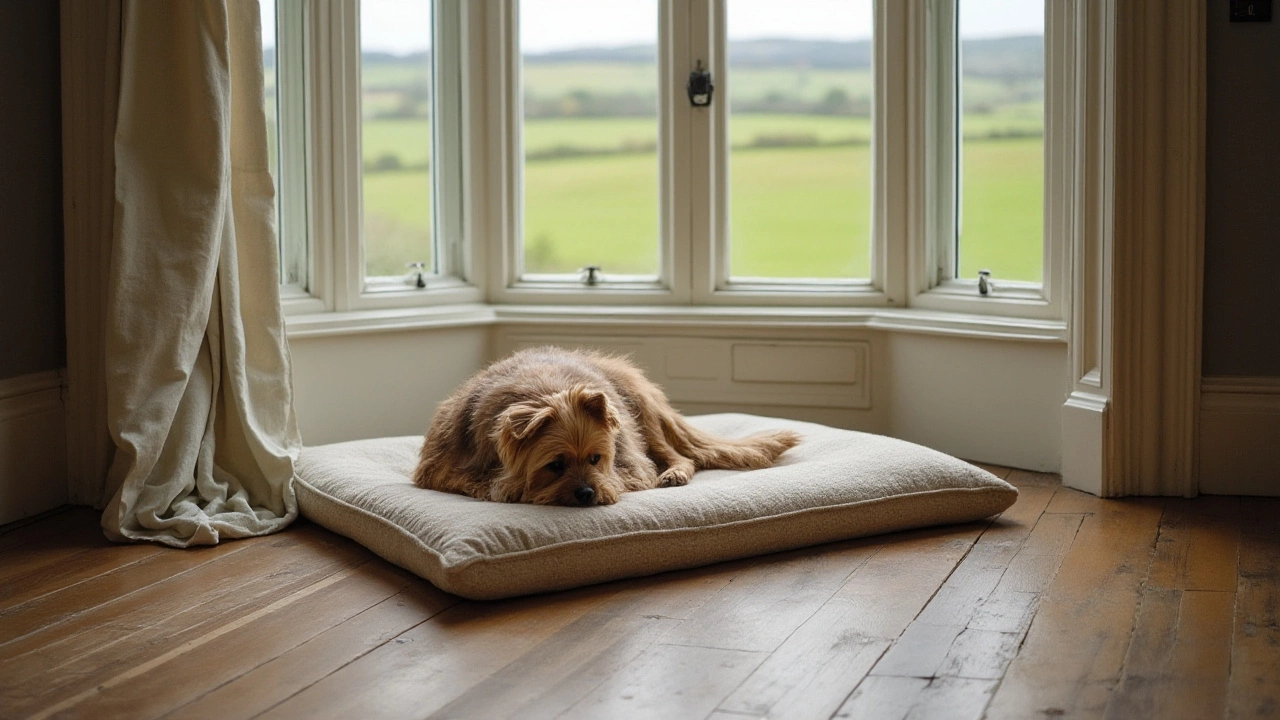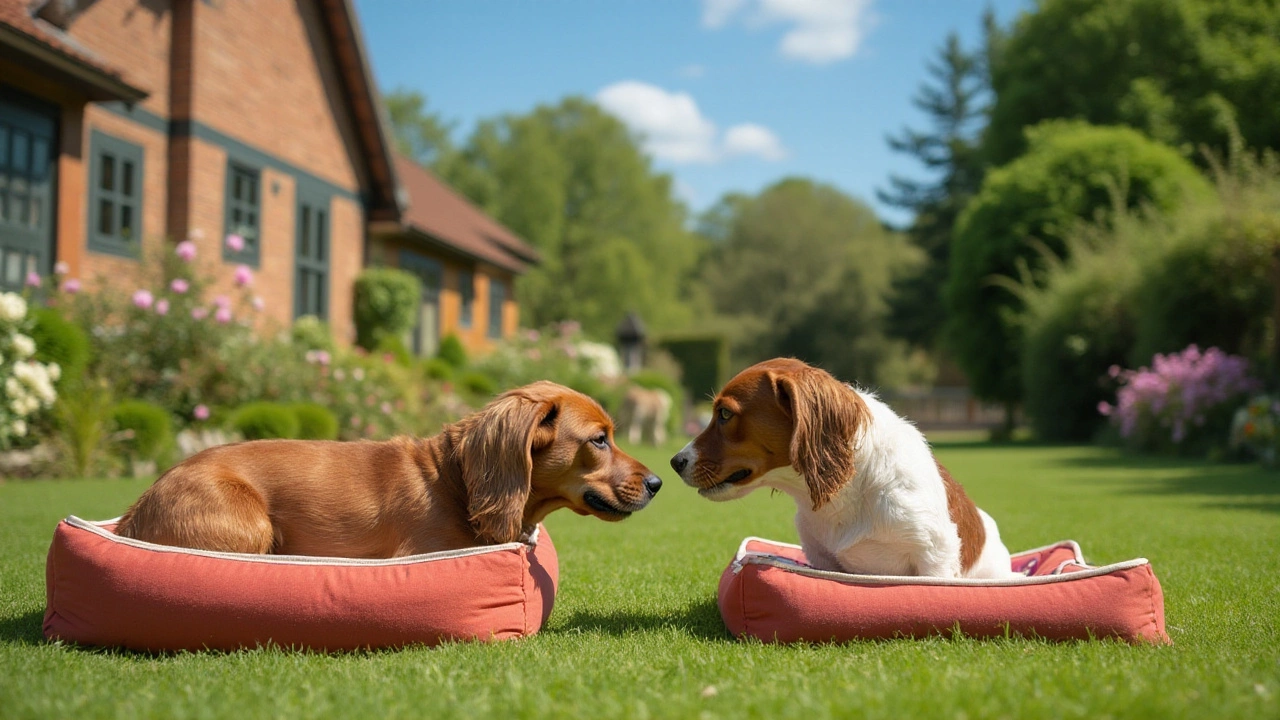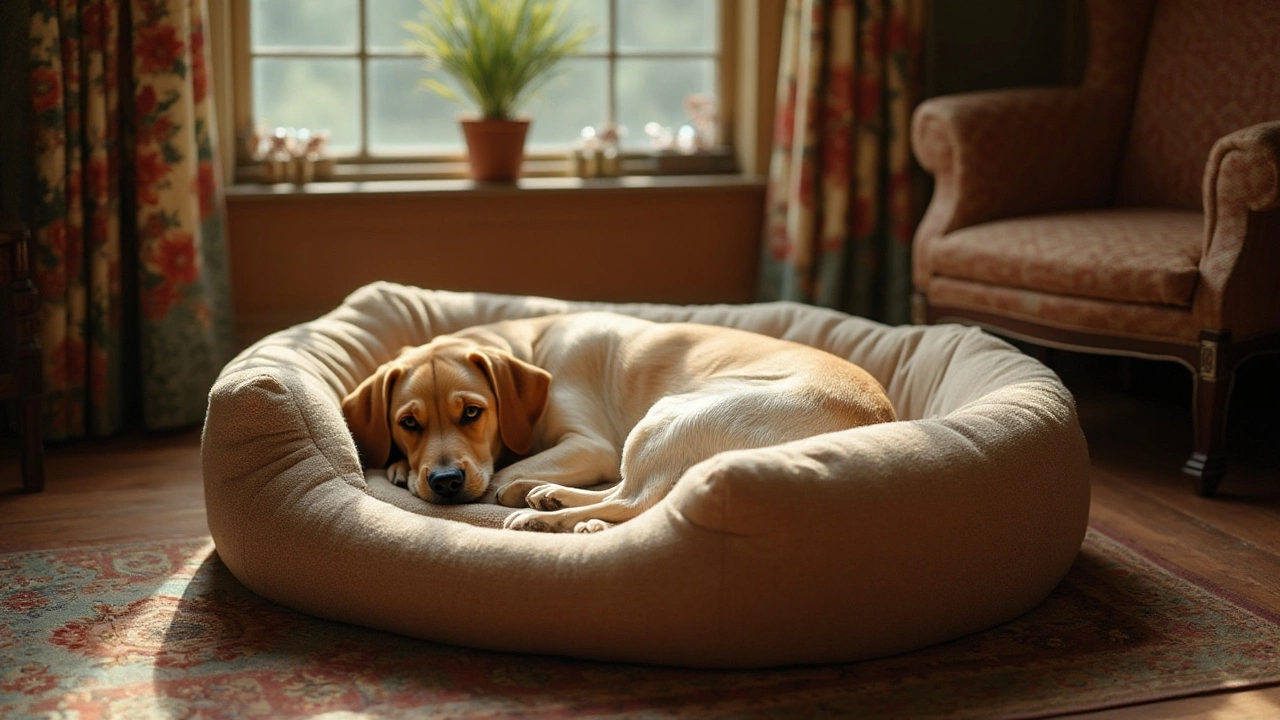Every dog owner knows the importance of a good bed for their furry companion. Sleeping is a big part of a dog's life, and making sure they have the perfect spot to rest is crucial for their health and happiness. In the market filled with endless options, deciding between a round and a square bed might seem trivial but can actually make a big difference.
Dogs, like humans, have their own sleeping preferences which are worth paying attention to. A round bed might provide the comfort of curling up into a safe, cozy ball, while a square bed offers the space to stretch out and relax their muscles. By understanding these sleeping habits and preferences, pet owners can better meet the needs of their beloved companions.
- Understanding Your Dog's Sleeping Habits
- Benefits of Round Dog Beds
- Advantages of Square Dog Beds
- Factors to Consider When Choosing a Dog Bed
- Final Thoughts on Dog Bed Selection
Understanding Your Dog's Sleeping Habits
Every dog has its unique way of resting that often mirrors their personality and natural instincts. Observing these sleeping habits can offer valuable insights into your dog's physical and emotional well-being. Some dogs love to curl up into a tight ball, which can be traced back to their wild ancestors who did this to conserve warmth and protect their vital organs from predators. This behavior might indicate your dog feels the need for security and warmth.
On the other hand, dogs that prefer to sprawl out might be displaying signs of trust and relaxation in their environment. These dogs might enjoy square beds as they allow them to stretch their limbs freely. This position may also indicate that your dog is confident and not worried about their surroundings, suggesting they feel safe. Quite interestingly, a study by the National Research Council’s Institute for Laboratory Animal Research has shown that sleep positions can significantly affect the overall sleep quality in canines.
Different breeds may also have different tendencies. For example, greyhounds, with their long and slender bodies, often prefer to stretch out. In contrast, breeds like dachshunds and Jack Russell terriers, known for their excitable natures, often feel more comfortable curling up. Understanding these natural predispositions can guide you towards the right shape and style of bed, whether it's a round dog bed or a square one.
Moreover, consider your dog's age. Puppies often need more cushioning as they are growing and exploring the world. Elderly dogs, who might suffer from arthritis or joint pain, may prefer softer, more cushioned beds where hot spots won't form. Diverse sleeping arrangements in various parts of the house can also cater to your dog’s different moods and needs throughout the day, ensuring they always have the perfect place to nap.
Aiko Takahama, a renowned canine behaviorist, once noted, "Observing your dog's sleep behavior is like reading a map of their soul; it tells you where they feel comfortable and secure."
With this insight into your dog's preferences and habits, you can make a more informed decision. By matching their natural behaviors with a suitable bed, you ensure not only their comfort but also support their health, energy, and happiness. The choice between a round and square bed becomes clearer when you consider these nuanced sleeping habits.
Benefits of Round Dog Beds
When it comes to creating the perfect resting place for your furry friend, round dog beds hold a special appeal that aligns well with many dogs' natural instincts. Dogs are descendants of wolves, and this lineage often influences their behavior, including how they sleep. In the wild, canines tend to circle around and nest before lying down to rest. This behavior is deeply ingrained as it helps them create a safe and comfortable space, much like the embrace a round bed offers. Round dog beds replicate this instinctive nesting behavior by providing a snug, enclosed feeling.
The cozy design of a round bed can be particularly beneficial for dogs that enjoy curling up. The circular shape encourages a compact sleeping position, which helps maintain body heat. This is advantageous for smaller breeds or dogs with low body fat that might get chilly more easily. The edges of the bed can provide a sense of security, akin to the natural dens dogs would make in the wild. This enclosed environment can mean a more restful sleep by lowering the stress levels and making them feel protected.
Additionally, round beds can be easy to fit into various spaces around the house. Their compact design makes them a versatile option for those who might be limited on space yet still want a comfortable resting place for their pup. Whether you're placing it in a corner, by the sofa, or even in a car, a round bed's adaptability ensures it suits many environments. Dr. Ellis from the Pet Sleep Research Institute notes:
"Round dog beds can mimic the natural den-like feel that many dogs inherently seek, which can support their psychological comfort and promote deeper relaxation."
Round beds also often come in styles where the sides are slightly elevated, acting as a pillow for dogs who like a place to rest their head. This feature not only adds comfort but can also be supportive for dogs with joint issues, providing ease on their neck and back. Pet parents frequently choose these beds for their orthopedic benefits as they offer both comfort and support.

Advantages of Square Dog Beds
Square dog beds offer a unique set of advantages that cater to both dogs and their owners alike. One key benefit is the flexibility in placement within a home. These beds fit snugly into corners or alongside walls, maximizing space efficiency in rooms of any size. This can be a significant asset, especially in smaller living environments where space is at a premium. Additionally, square beds often provide a sleek, modern look that complements home decor, blending seamlessly with the styles of many interiors.
More than just practical, square beds are often preferred by dogs who enjoy stretching out during rest. The generous surface area allows dogs to sprawl flat, which can be beneficial for breeds that are larger and need additional room to remain comfortable. This design supports joint health by allowing limbs to fully extend, which is particularly important for breeds prone to joint issues such as Golden Retrievers and German Shepherds. This additional space can lead to more restful sleep, promoting better overall health.
When considering the maintenance of a dog bed, one cannot overlook the ease of cleaning. Square beds typically feature removable and washable covers, making it simpler to keep the bed fresh and hygienic. This can be particularly beneficial for active dogs who often bring a bit of the outside world back with them. A clean bed not only contributes to your pet's comfort but also helps maintain a healthy living space for everyone in the household.
The construction of square beds often includes firm bolsters or edges, which can provide a sense of security for dogs who like to feel encased while resting. These structured sides can also support a dog's head and neck, offering additional comfort while lounging. For older dogs, or those with specific health issues, having a bed that offers both support and comfort is crucial. In fact, the American Kennel Club suggests that specialty beds can be beneficial for dogs with arthritis or other orthopedic conditions by providing the necessary support to alleviate pressure on joints.
As Dr. Susan Holloway, a renowned veterinarian, once mentioned, "Ensuring your pet's comfort isn't just an indulgence; it's a critical component of their health regimen. The right bed can make all the difference for dogs of any age."
In terms of versatility, square beds often come with additional features such as water-resistant liners or memory foam bases that cater to diverse needs. Memory foam, in particular, can adapt to your dog's body shape, distributing their weight evenly to prevent pressure sores. This adaptation can lead to improved sleep quality, what many pet owners consider a top priority. Moreover, these features extend the lifespan of the bed, offering more value over time.
For multi-pet households, square beds can serve as communal resting spaces, fostering a sense of togetherness among furry companions. Their spacious design allows multiple small dogs to rest together comfortably, or one large dog to bask in the extra space. This communal aspect can enhance playtime dynamics and social interactions, contributing positively to the animals' social development.
Factors to Consider When Choosing a Dog Bed
Choosing the right dog bed is not just about aesthetics; it's about your pet's comfort and health. Consider your dog's size and weight, as both are crucial factors. A small Chihuahua will have different needs compared to a large Labrador. A bed that's too small may cramp your dog's space, leading to discomfort, while a bed that's too large may not provide the sense of security some dogs crave. Measure your dog from nose to tail and add a few inches to determine the ideal bed size, ensuring your pet can sleep comfortably in its preferred position.
Material matters when selecting a dog bed. Dogs with allergies or sensitive skin might benefit from hypoallergenic materials, just as dogs prone to cooler temperatures would appreciate beds with insulating fabrics. Orthopedic beds with memory foam might be necessary for older dogs or those with joint issues, providing support and relieving pressure points. On the other hand, younger, healthy dogs might prefer simpler cushioned or bolstered designs. It’s important to ensure the materials are durable yet comfortable, considering your dog’s lifestyle.
Think about your dog's sleeping habits. Do they curl up into a ball, or do they stretch out like a noodly creature taking over your living room? Dogs that curl might favor a round bed, often with raised edges or bolsters to snuggle against, resembling their instinctual pack behavior. On the other hand, those with stretchier sleeping positions might appreciate the room provided by a square bed.
"Understanding your dog's preferences and adapting your choice can improve their quality of rest," suggests renowned pet behaviorist, Dr. Susan Wright.Moreover, keeping an eye on how your dog sleeps can often offer insights into the best bedding option.
Dog bedding should also be easy to clean. Consider the practicality of a removable cover that can be tossed into the washing machine. Dogs, regardless of breed, are prone to shedding, drooling, and the occasional messy accident. A bed with a washable cover not only helps maintain a clean environment for your pet but also keeps your home smelling fresher. Some beds also feature waterproof liners, an added bonus for puppies or senior dogs prone to incontinence.
Don't overlook the style of the bed. While your dog's comfort is paramount, the aesthetics of a bed that clashes with your home might bother you. Fortunately, dog beds come in various designs and colors, allowing you to find something that suits both you and your pet. It's also wise to think about the bed's placement. Dogs like to be where the action is, not tucked away in a seldom-used room. A high-traffic area might require a sturdier bed that withstands more wear and tear.
Lastly, budget is a significant factor for most pet owners. While it may be tempting to choose the cheapest option available, investing in a quality bed can ultimately be more cost-effective. Higher-priced beds often last longer and come with features beneficial to your dog's health, like enhanced support or better materials. Also, consider the cost of additional accessories, such as blankets or washable covers, for maintaining your dog's bed, providing a comprehensive sleeping environment.

Final Thoughts on Dog Bed Selection
As you embark on the journey to find the perfect bed for your canine companion, it's essential to keep in mind the various factors that play into their comfort and health. Dogs come in all shapes and sizes, and so should their beds. It's not just about picking a style that matches your decor but rather ensuring you're choosing a bed that meets the specific needs of your dog. Whether your pup is a senior who requires orthopedic support or a young pup that thrives in a plush, cuddly environment, the right choice can significantly enhance their quality of life.
Many dog owners lean towards preferring the aesthetics or the price of the bed over functionality. While budget is certainly a significant consideration, remember that investing in a quality bed now can save you money in the long run by avoiding health issues that might arise from inadequate bedding. For instance, large breeds often benefit from square beds with bolstered edges, allowing them to stretch out fully and support their joints. Conversely, smaller dogs and those who enjoy a sense of security tend to nestle within the cozy confines of a round bed.
Choosing between round and square dog beds can seem like a simple matter, but there's more nuance involved. The decision should be driven by an understanding of your dog's unique behavior and health needs. Pet comfort is the utmost priority. According to the American Kennel Club, "A dog's bed should cater to its individual needs, whether providing warmth or support for their joints."
"A well-chosen dog bed supports not just a restful night's sleep but overall quality of life," notes Dr. Karen Becker, a reputable veterinarian.
It's also worth considering materials when selecting a bed. Hypoallergenic fabrics and easy-to-clean materials can make a big difference in maintaining a healthy space for both your dog and your home. Some pets might have sensitivities or allergies requiring particular fabrics which minimize allergens. Many modern dog beds come with removable and washable covers, which makes maintenance a breeze and further enhances pet comfort.
Finally, don't underestimate the importance of observing your dog's sleeping habits. Dogs, much like people, have sleeping preferences that can give you clues about which bed they'll prefer. Take the time to evaluate whether your dog likes to sprawl out or curl up, and pay attention to how they sleep in various environments. Perhaps they enjoy company and prefer sleeping in the vicinity of people. Each of these details contributes to making an informed choice that meets your dog’s specific needs.
By combining your understanding of your dog’s preferences with a bit of research, you’ll be well-equipped to select a bed that not only meets your dog’s physical requirements but also offers them a little slice of comfort heaven. After all, their comfort is a reflection of their overall well-being and happiness, which every pet owner strives to nurture.
